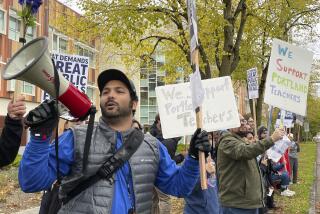S. Africa Students End Boycott; Move Could Ease Unrest
- Share via
JOHANNESBURG, South Africa — Black students returned to classes across South Africa on Tuesday, ending a school boycott of nearly a year to protest their inferior educational system and to demand broad political reforms.
Tens of thousands of students who had remained away from classes when school officially resumed three weeks ago went back under a pact worked out by black community leaders with South Africa’s minority white government. If successful, it could become a model for future negotiations.
Most of the students had been out of school for almost a year, and some for as long as two. Their return to classes could bring a substantial reduction in the level of civil unrest here, since idled students on the streets have often been involved in demonstrations and confrontations with the police.
But continued attendance by the 1.8 million students in urban black schools depends on the government’s response to a series of conditions put forward at a national conference here a month ago.
Most black political observers say the students could be out of classes again, possibly joined on the streets by their parents in a general strike, if there is not quick progress.
The conditions include termination of the six-month-old partial state of emergency, withdrawal of troops from black townships, release of detainees and other political prisoners, establishment of elected student councils, reinstatement of dismissed teachers and legal reinstatement of the Congress of South African Students, which was outlawed in August.
The government, expressing hope that there would be full black school attendance by the end of this week, promised that there will be equal education for all races within a decade.
‘We Need Them’
“I see it of the utmost importance that we succeed in educating our black people,” Sam de Beer, deputy minister of education, said in Cape Town. “We need them, and I think it is the only way of working out a peaceful future. . . . We are working towards a situation where all population groups will receive the same education, and we are committed to this.”
A new center of influence emerged from the ending of the boycott. By demonstrating that it has the broad support of the country’s militant black youths, the Soweto Parents Crisis Committee, which negotiated the return to school, now becomes a formidable political force within the black community. The government must continue to negotiate with the committee in order to reduce the continuing unrest.
The students, closely supervised by leaders of local youth groups, generally remained orderly on Tuesday, but scattered incidents of violence were reported as the police and army maintained a low-key presence in the country’s black ghetto townships.
Police Kill Youth
The most serious incidents were in Soweto, the black satellite city outside Johannesburg, where police and youths clashed several times. In one incident, a youth was reportedly killed when police opened fire, first with tear-gas grenades and then with birdshot, on several hundred black youths marching from one school to another in opposition to the return to classes.
Police spokesmen said the youths had set two schools on fire, thrown firebombs at eight vehicles and stoned police patrols, which then used tear gas and birdshot to disperse them. The police said there were no injuries or deaths.
On Monday, policemen shot and killed a 15-year-old schoolgirl and a brewery worker, 35, in the black township of Kagiso, west of Johannesburg, when they broke up a back-to-school rally at a Catholic church.
After denying that the incident had occurred and threatening to prosecute local newsmen who reported it, police headquarters in Pretoria on Tuesday accused the students of throwing stones at a passing patrol, which opened fire with shotguns in return.
Further incidents were reported in Kagiso on Tuesday.
In Cape Town, meanwhile, four people were killed and several seriously injured in continued fighting by rival black political groups around the Crossroads squatter settlements outside the city. Two teen-agers had been hacked to death with axes, police reported, one man had been stabbed with a knife and the fourth had been beaten and burned alive.
The long-running dispute is over leadership of the settlement and the squatters’ tactics to secure better housing, jobs, schooling and health services.
Another person died in the eastern Cape provincial town of Burgersdorp after being shot by police in a weekend incident.
More to Read
Sign up for Essential California
The most important California stories and recommendations in your inbox every morning.
You may occasionally receive promotional content from the Los Angeles Times.













